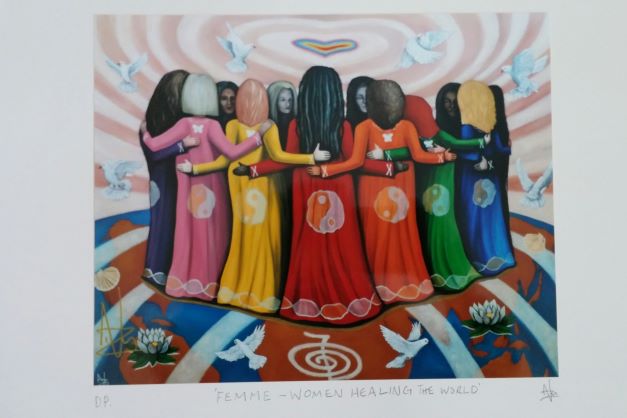REKINDLING THE TORCH OF CHOICE
Those of us who are over 50 have reached that comfortable age when we no longer have to worry about an unintended pregnancy. For us, the issue of reproductive choice has faded in importance. But for our daughters and granddaughters of
childbearing age, it should still matter—now more than ever.
Those of us who became sexually active in the 70s had protections in place to safeguard us from unwanted pregnancy. In 1972, the Supreme Court ruled that unmarried women could legally be prescribed birth control pills. And then in 1973, the landmark Roe v. Wade decision gave women the right to make decisions about whether or not to have an abortion. These protections are still largely in place in 2015. However, with the aggressive anti-choice agenda being pushed by state and federal lawmakers, that may not be the case by the next presidential election.
I’ve always advocated choice, simply because I felt another person should never have any say over any decisions regarding my body. Choice dovetailed with the years I became sexually active, and my reproductive choices were protected under the law.
Legal protection of women’s reproductive choices has been under relentless assault for some time, and those efforts are escalating. Republicans in Congress, emboldened by their new majority, introduced five abortion restrictions in the first three days of the new legislative session! Their proposed restrictions would severely limit women’s access to abortion. Politicians are inserting themselves in the most private and personal medical decision that should be left up to a woman and her doctor.
What is truly baffling is their quest to defund Planned Parenthood. One in five women visits a Planned Parenthood clinic at least once in her life. Why would Republicans want to defund Planned Parenthood when it helps to prevent more than half a million unintended pregnancies each year, thereby making the need for an abortion moot? It seems irrational, and at cross-purposes. Yes, Planned Parenthood is there when a woman needs abortion care, but performing abortions is only three percent of the many services they provide. Why inhibit a woman’s access to birth control, pelvic screenings, breast exams and other health-and-reproductive-related services?
We are going backwards, and the generations of women who are of child-bearing age do not seem meaningfully motivated to halt this persistent march back to the days of no choice. They’ve lived with the victorious results of a hard-won battle that raged through the 60s and early 70s. That is ancient history to them, but it isn’t ancient history to those of us who saw the battle being waged and first benefitted from its accomplishment.
The Women’s Liberation Movement, like the Civil Rights movement, required organization, dedication, and unification to be recognized. The impetus for that kind of solidarity is not there today. The pro-life movement, on the other hand, has burgeoned and is gaining strength day by day. Both the Civil Rights and Women’s Liberation Movement brought about positive changes in society. Imagine if legislation were being churned out to prohibit African-Americans from having the same rights as white people, such as drinking from the same water fountain? Would you not think, That’s nuts! They can’t do that! We’re way past that!
Why aren’t women reacting as strongly to the potential loss of their right to make decisions about their own bodies?
Perhaps it is because we older women have become unworried, since we are no longer personally affected. Maybe it is because younger women don’t know about or can’t relate to the horrors of backroom abortions. They may know women who have had an abortion–a safe, legal medical procedure; but they don’t know women who died from a botched abortion.
The Nineteenth Amendment that gave women the right to vote was also hard fought for and won. Think about how you took for granted your right to vote when you turned eighteen. In that same way, younger women are taking for granted that they will have reproductive choices in the future. But that is not so. Even access to birth control, as we can see by the assault on Planned Parenthood and the SCOTUS decision in the Hobby Lobby case, is under attack.
It is time for women of every generation to stop taking choice for granted. Let’s acknowledge that the Republican’s answer to birth control—total abstention—is unrealistic, and that it is up to us to keep birth control and safe abortions accessible. This is going to require our generation’s involvement. Those of us who enjoyed virtually worry-free sex must educate younger women about how difficult it was when women had no access to birth control or safe abortions.
It is time for our generation to rekindle the torch of choice, and to pass it down. It is time for us, the most outspoken, inspiring and audacious women in history, to shake women of all ages out of their complacency! Our legacy should be the empowerment of younger women in constructing stronger, independent lives that aren’t lived according to ideals imposed by men. It is our duty to encourage them to fight for the continued right of choice, so that they can in turn inspire the generations of women who come after them to do the same.
We are not too old to take up the battle. Let us give others the benefit of our experience and knowledge. We lived it, so we can talk of it with intelligence and confidence. Let’s start by engaging our daughters, granddaughters, and young friends in meaningful conversations about what the loss of choice will mean for them. Let’s emphasize the value of their vote, and enlist their support of organizations that support choice, like Planned Parenthood, NARAL and Emily’s List.
Let us not go gently into our golden years. Instead, let us reinvigorate and do what we can now to help preserve a woman’s most fundamental right—the right to have total control over her own body.


